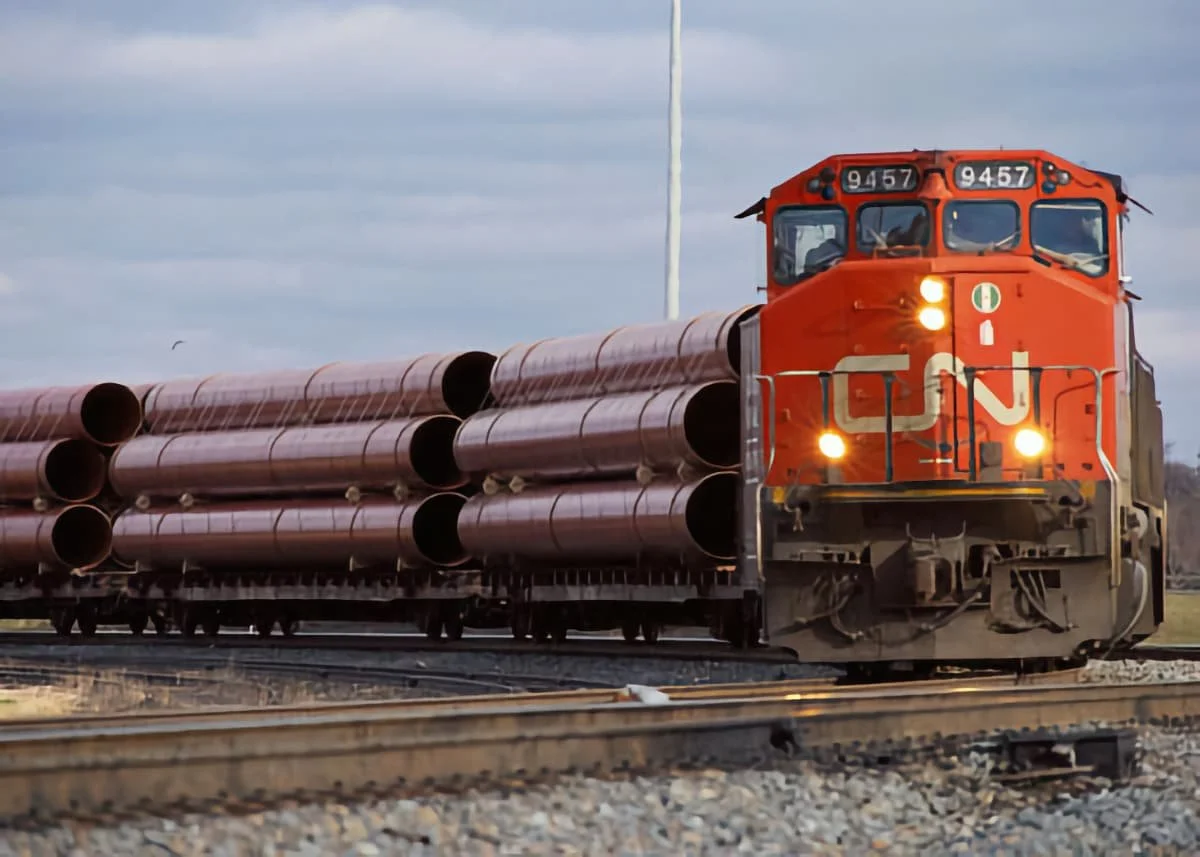Labour Disruption of deep concern for Sask mining sector
Labour Disruption in Class 1 Railways of deep concern for Saskatchewan’s mining sector, says Saskatchewan Mining Assoc.
By Brian Zinchuk
REGINA – The Saskatchewan Mining Association (SMA) issued a press release on Aug. 20 expressing deep concern regarding the imminent work stoppage at Canada’s major railways CN and CPKC. Saskatchewan mining operations depend on reliable rail service to deliver their products (primarily potash) to ports and other distribution centres. Canada exports 95% of Saskatchewan’s potash to global markets (US, China, Brazil and India).
A CN train hauling pipeline pipe. Photo courtesy CN
The ongoing disruptions to the National Supply Chain, this time related to Class 1 railways has immediate and long-term impacts on Saskatchewan’s mining industry, SMA said. “The potential work stoppage would result in an unprecedented and catastrophic disruption of Canada’s supply chain. The production and shipping of Saskatchewan potash and receipt of all personal and commercial goods that come from ports via the railways would be critically impacted and that would be very harmful to Canada’s economy and reputation as a reliable global trading partner.”
“SMA is calling on the federal government to take immediate action through binding arbitration to prevent a work stoppage that would have serious financial impacts on the Canadian economy including the Saskatchewan mining sector. Rail is the only way to transport bulk tonnage product to export markets. Labour disruption results in production stoppage at potash mine and mill facilities. Saskatchewan’s potash producing companies, Nutrien, The Mosaic Company and K+S Potash Canada, as well as Canpotex, rely on the railways to move their bulk commodity from land-locked Saskatchewan to export markets. The inability to import inputs for mine and mill facilities (large equipment and process reagents) can result in production slowdowns or shutdowns of other mine/mill facilities (potash, gold, uranium, coal, copper-zinc).”
SMA noted Saskatchewan is the world’s largest producer of potash, providing approximately 33% of the world’s supply, and directly employing over 6,300 residents, with an annual sales value of $10.9 Billion CDN$ in 2023. Canadian potash is made with approximately 50% fewer greenhouse gas emissions than potash produced by global competitors – Belarus and Russia. The inability to reliably deliver product to international clients will result in additional loss of potash market share to global competitors as was experienced in the 2023 West Coast Ports Strike.
Mining is a major user of Canada’s Class 1 railways and is the largest shipping sector by volume and value for both rail and marine transport. Disruptions to Canada’s major railways has damaging effects on the mining industry and is very harmful to Canada’s economy and reputation, devasting the supply chain and Canadian and global customers.
“We call on the federal government to take all possible steps to prevent a labour disruption of Canada’s Class 1 railways”, said Pam Schwann, SMA President. “We know from past port and rail service disruptions that for every day of strike there are typically 7 days of recovery to clear the backlog of shipments. Even a few days of stopped or delayed services takes the system weeks to recover, with a cost in the billions of dollars”.
“When sales are lost, our competitors in Belarus and Russia will position their product to replace what we can’t ship, diminishing the country’s global potash competitiveness and damaging Canada’s reputation as a reliable trading partner,” said Schwann.

